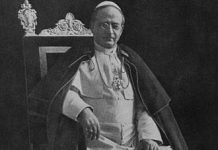Back in 2003, I argued with a priest friend over his support for proposed legislation governing reproductive technology, which would legalize, and fund, things like in vitro fertilization, bringing them under government control. He was not in support of these procedures themselves – condemned by the Church in no uncertain terms – but, with many other bishops, priests and prominent laity, he held that some law was better than no law.
Hence, in Canada, men and women are free to donate their gametes – sperm and ova – but, unlike the U.S., it’s illegal to be paid for such. Hence, the pool of donors dries up – pardon the pun – which leads to the following quite true tragedy:
Sperm Donors Who Fathered 600 Children a Public Health Issue
‘Sperm donors’ in the plural is a bit misleading, for it turns out that the donors amount to three men – yes, three – who together fathered the 600 children. You’d have to go back to the pagan days of Genghis Khan to get that many offspring from one set of gonads. Most of these children are, therefore, related biologically as siblings, even if they’re likely not aware of that fact.
Why only three? Well, without remuneration, there’s not much incentive to donate one’s genetic material. Who wants to have the threat of a paternity suit – or three hundred of them – looming Damocles-like over them for the rest of their life? That is, excepting a few oddballs who perhaps think this some sort of work of charity, of a perverted sort, of course. Or they’re motivated by some implicit narcissistic Darwinian drive, want as much of their DNA out there as possible, in accord with Dawkins’ selfish gene hypothesis.
Whatever their motives, applying the term ‘father’ to these men is a misnomer. For they do not take on that noble task, except in a most distant genetic sense. They will never know the children they have begotten, and, more to the point, their children will never know them. They masturbate, their sperm collected, which is then injected into embryos in a dish. They don’t even bother the minimal work of copulating, which the warlord Khan at least had to do, never mind bonding with a specific woman and raising children.
Speaking of women and children, who are the poor females impregnated by these patres ignoti? Are these sperm donors – that term! – tall, short, fat, skinny, ugly, handsome, old, young, diseased or healthy? And what if some of those 600 wandering orphans end up meeting each other, not knowing they’re related, and falling in love? In the shrinking population pool of Quebec, it’s hard enough to find a fitting spouse. There’s also the problem of the lack of genetic diversity, with the concentration of damaged recessive alleles, and all that implies, which even the benighted government admits:
This is extremely worrying. … What about the risks in relation to certain diseases? Also inbreeding. It doesn’t have to be the Wild West. It requires supervision as quickly as possible,” (interim Liberal Leader Marc Tanguay)
One may look beyond the Quebec borders, to certain, ahem, ‘cultures’, wherein marriages between cousins are common, which have to have special homes for the genetically damaged offspring.
Public health issue, indeed.
But the deeper and more poignant problem is the moral one, which brings us back to my argument with the priest. The Church has always taught that although certain moral evils have to be tolerated in any society, these same evils must never be directly enshrined into law.
This is especially the case for grave evils against life and the family, which undermine, and even disintegrate, society like no others.
There are situations, discussed by Pope John Paul II in Evangelium Vitae in reference to abortion, wherein one may vote for a less evil law, as opposed to one that is more evil:
A particular problem of conscience can arise in cases where a legislative vote would be decisive for the passage of a more restrictive law, aimed at limiting the number of authorized abortions, in place of a more permissive law already passed or ready to be voted on. Such cases are not infrequent. It is a fact that while in some parts of the world there continue to be campaigns to introduce laws favouring abortion, often supported by powerful international organizations, in other nations-particularly those which have already experienced the bitter fruits of such permissive legislation-there are growing signs of a rethinking in this matter. In a case like the one just mentioned, when it is not possible to overturn or completely abrogate a pro-abortion law, an elected official, whose absolute personal opposition to procured abortion was well known, could licitly support proposals aimed at limiting the harm done by such a law and at lessening its negative consequences at the level of general opinion and public morality. This does not in fact represent an illicit cooperation with an unjust law, but rather a legitimate and proper attempt to limit its evil aspects.
This is a controversial paragraph, which needs some unpacking in future posts. But what the Church, through this Magisterial teaching does not allow, however, is the instantiation of a law giving explicitly giving permission, even public funding, for grave evil, out of the blue and ex nihilo, which is what was done here in Canada back in 2004 with the ‘Assisted Human Reproduction Act’, the bitter fruits of which we are now witnessing. The children who live are the fortunate few, for there are thousands who die in the process of IVF, and the fate of the thousands of frozen embryos who do make it, but are left in a state of stunted suspended animation hanging in the balance between life and death.
John Paul II called for an end to the artificial reproduction of embryos, and may we all join him in that chorus against this culture of death and mayhem, and, through the Church and the family, build a true culture of life and love.












